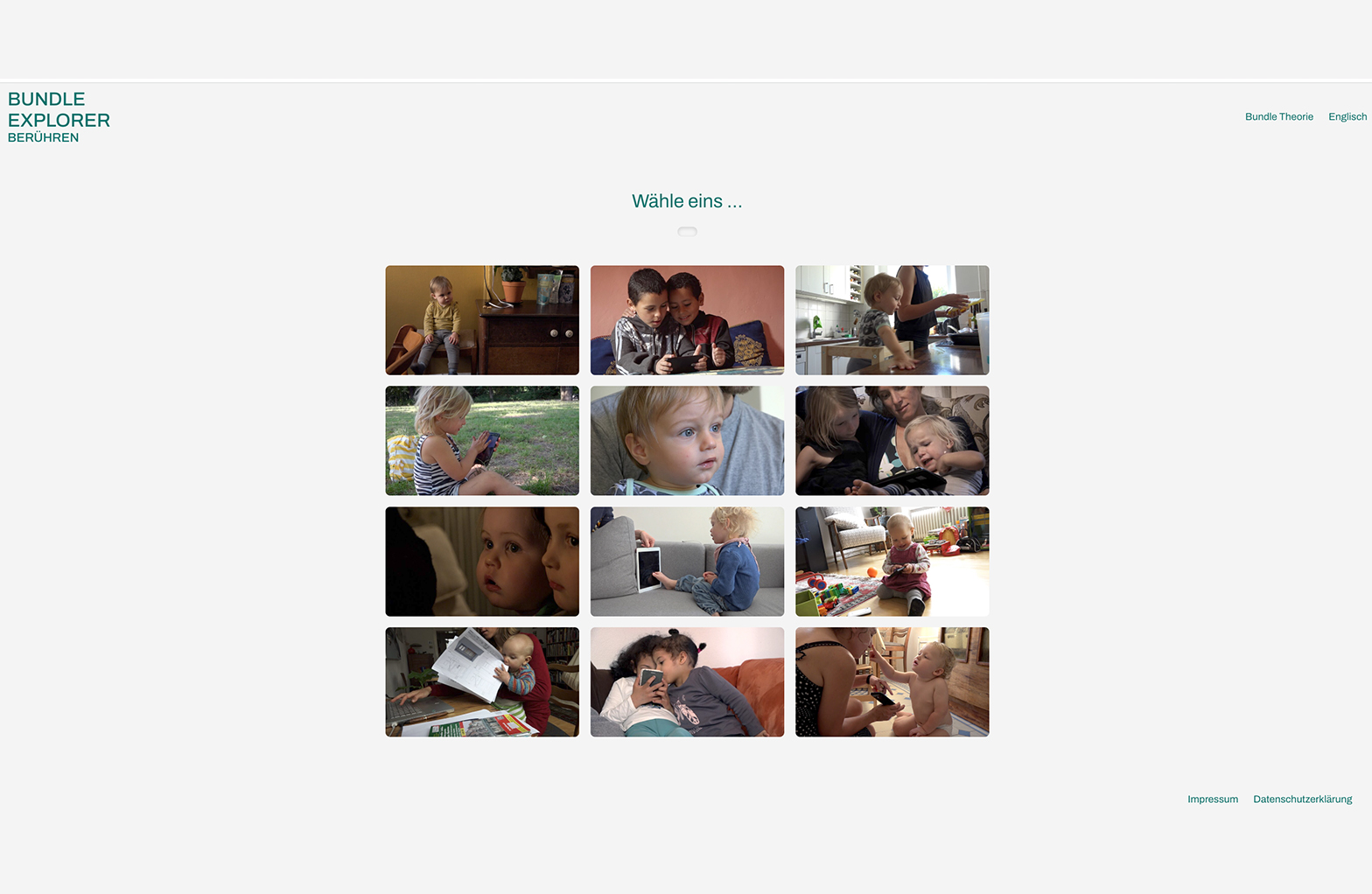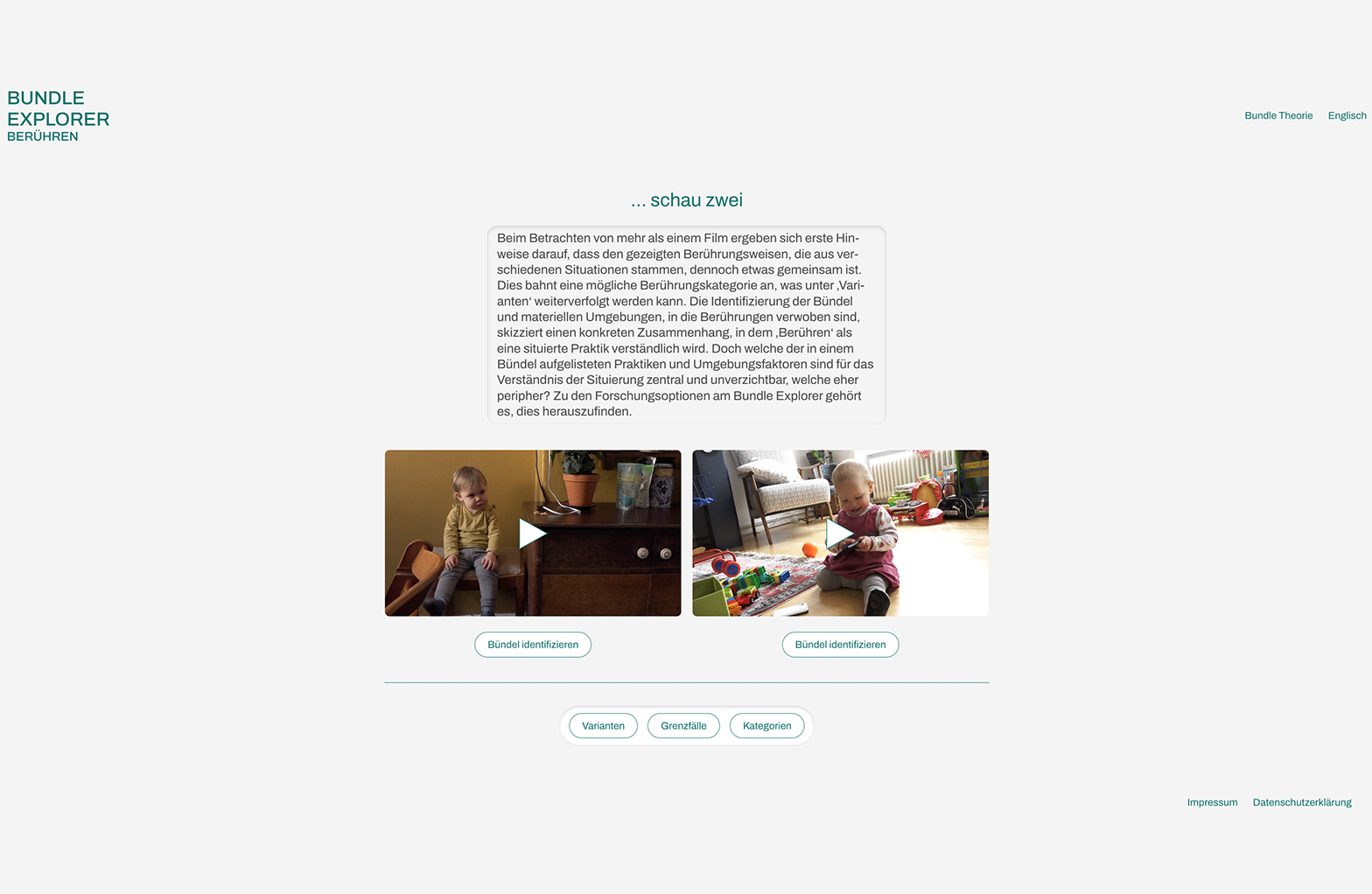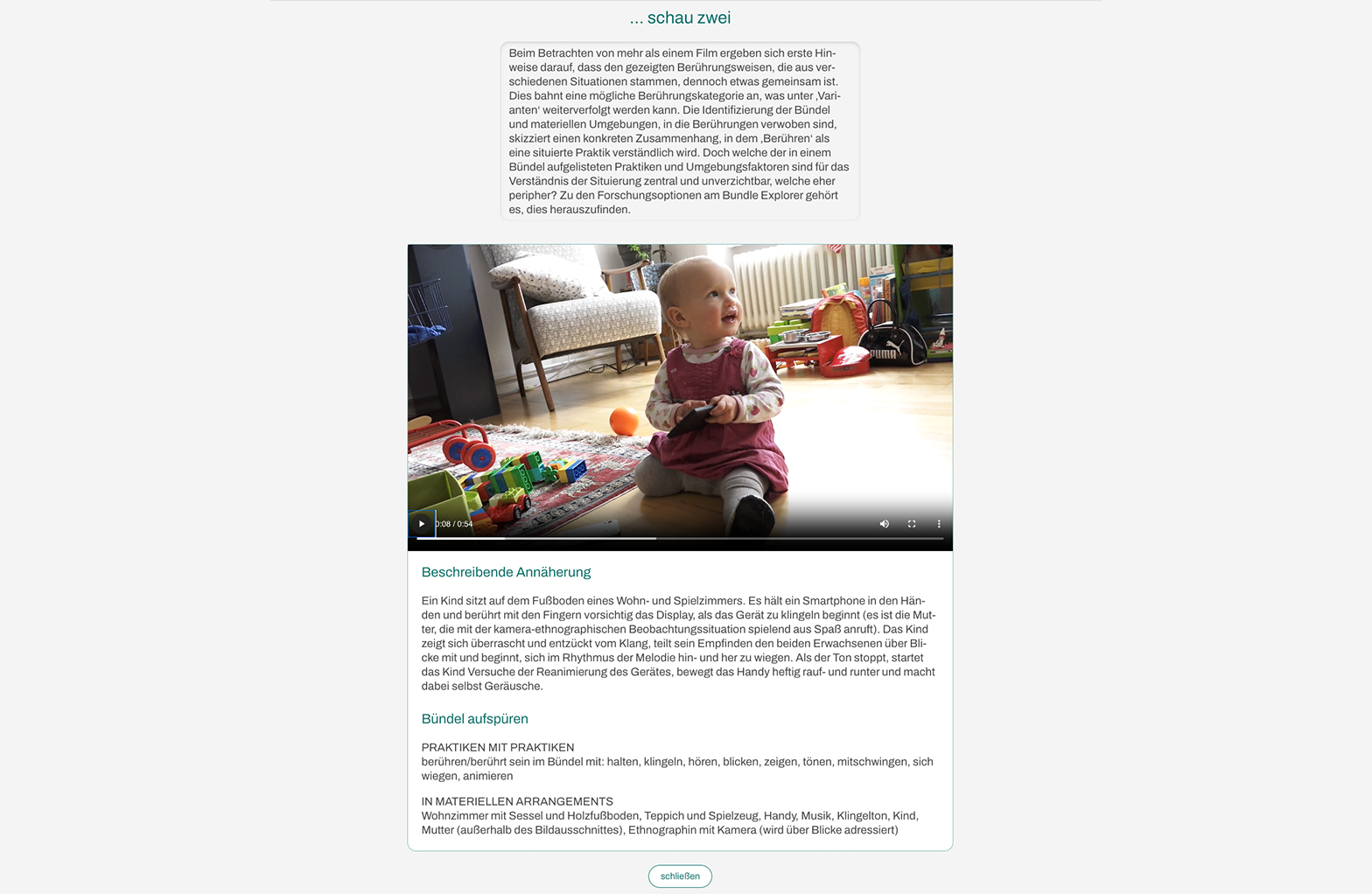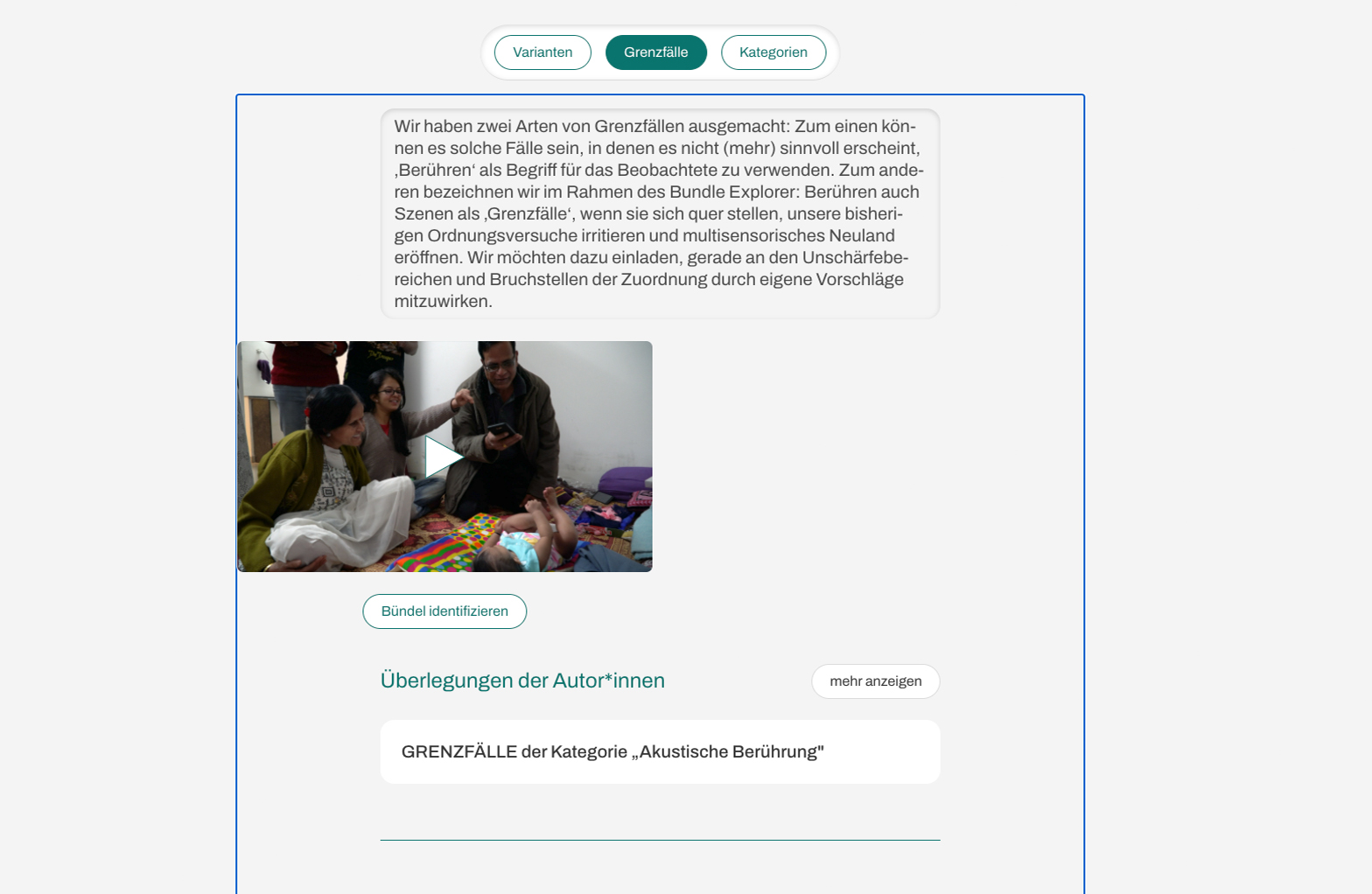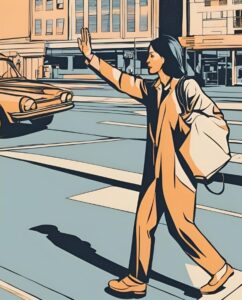News
The datafied Web – 6th RESAW 2025 conference
June 4 – 6, 2025, at the University of Siegen
Registration for the 6th RESAW conference (June 4-6) is now open. You can register on our conference website until May 15th.
About the registration
Registration for the pre-conference is not mandatory but highly appreciated. Spontaneous participation is also welcome. During registration, please indicate whether you will be joining us for dinner. Vegetarian and vegan options will be available. If you have specific dietary requirements, don’t hesitate to get in touch with the organizers. We aim to include precarious scholars—please contact the organizers if you need support or would like to discuss possible options. Email: RESAW25-datafiedweb[æt]uni-siegen.de
About the conference
We look forward to more than 40 presentations by over 70 researchers from 11 countries who shape the amazing program of the 6th RESAW 2025 conference. The conference will take place on June 4-6 at the University of Siegen.
The conference promises insightful discussions on current research questions related to the trends, trajectories, and genealogies of a datafied and metric-driven web. It will also foster critical dialogue on the challenges and opportunities posed by the rise of platform-driven ecosystems.
For more information about the program and detailed schedule, visit the conference website datafiedweb.net.
Follow us on social media for more updates ➞
#CRC2025 #resaw25 #webhistory #webarchives #datafication #archives
The 2025 RESAW conference is organized by the Collaborative Research Centre 1187 “Media of Cooperation” at the University of Siegen in cooperation with the Centre for for Contemporary and Digital History (C²DH) at the University of Lux-embourg. The conference is funded by the Deutsche Forschungsgemeinschaft (DFG, German Research Foundation) and the Luxembourg National Research Fund (FNR).
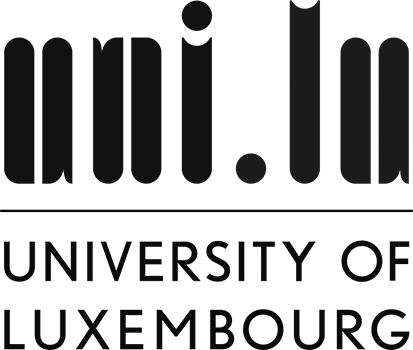
Location
University of Siegen
Campus US-C and US-S
Obergraben 25
57072 Siegen
Conference Program
See the conference programme on our website www.datafiedweb.net/program.
The new summer program
We welcome our members back to the new semester and summer program.
We are excited to announce our upcoming summer program which includes
- several workshops and conferences incl. the RESAW 2025 “The Datafied Web” conference, which doubles as the CRC’s annual conference,
- the lecture series “Unstitching Datafication,”
- three MGK Masterclasses (Workshop [Media] Practice Theory),
- the MGK Writing Retreat and Research Colloquium,
- and a Summer School.
This semester’s edition of the Research Forum will feature an event series dedicated to Science Communication & Public Engagement, including sessions on open science, communication strategies, and stakeholder engagement.
We look forward to inspiring talks and intriguing discussion. See you in Siegen or online!
Catalina Goanta, Benjamin Peters, Jürgen Streeck and Jill Walker Rettberg are new Mercator Fellows at the CRC 1187
The Collaborative Research Center (CRC 1187) “Media of Cooperation” welcomes four new Mercator Fellows: Catalina Goanta, Benjamin Peters, Jürgen Streeck and Jill Walker Rettberg. These outstanding researchers will contribute their scientific expertise and innovative approaches to the CRC 1187.
About the Mercator Fellowship at the CRC 1187
The CRC 1187 awards Mercator Fellowships to outstanding researchers worldwide to extend scientific collaboration within its network. Mercator Fellows work closely for extended periods with one or more projects. Together with its regular members, Mercator Fellows study digital, data-intensive media to develop interdisciplinary approaches further and help shape the CRC’s research programme. Including these renowned researchers strengthens the international network of the CRC 1187 and promotes the transfer of knowledge and ideas, which is of central importance for contemporary digital research at the CRC.
The Mercator Fellowship is a module within the German Research Foundation’s funding programme intended to facilitate a sustainable research exchange between the researchers of the CRC 1187 and the fellows.
About the Mercator Fellows
Prof. Dr. Catalina Goanta
Law, Economics and Governance
Molengraaff Institute for Private Law
University of Utrecht, the Netherlands
About Catalina Goanta
Catalina Goantas researches at the intersection of law, technology and society with a particular focus on platform regulation, content monetization and consumer law in the digital age. As head of the EU-funded ERC Starting Grant project HUMANads (2022-2027), she investigates how influencer marketing, algorithmic advertising systems and new forms of digital work should be evaluated from a legal and social perspective. In addition to her academic work, she is in demand internationally as an expert on platform regulation.
Goanta has been awarded for her innovative teaching and research approaches and received a fellowship at the Stanford Transatlantic Technology and Law Forum in 2017. This was followed by the Niels Stensen Fellowship in 2018. Her dissertation on the digitalization of contract law at Maastricht University laid the foundation for her intensive examination of the legal and social challenges of the platform economy.
Among her most significant publications are the 2020 anthology The Regulation of Social Media Influencers, which analyzes the regulation of social media influencers from various perspectives and highlights the challenges of influencer marketing, and the 2021 article “A New Order: The Digital Services Act and Consumer Protection” in the European Journal of Risk Regulation, which examines the EU’s Digital Services Act (DSA) from the perspective of consumer protection and intermediary liability.
Prof. Dr. Birgit Meyer
Department of Philosophy and Religious Studies
Utrecht University, the Netherlands
About Birgit Meyer
As a cultural anthropologist with over 30 years of experience, Birgit Meyer studies religion from a material and postcolonial perspective. Her research strivesfor a synthesis between empirical research and theoretical reflection in a broad multidisciplinary setting. Focuses of her research over time include religion in Africa; the rise and popularity of global Pentecostal churches; religion, popular culture and heritage; religion in (post)colonial settings; religion and media; religion and the public sphere; religious visual culture; and senses and aesthetics.
Her most significant publications include the 2021 open-access book Refugees and Religion: Ethnographic Studies of Global Trajectories, which understands religion from a material and corporeal angle, and addresses the ways in which refugees practice their religions and convert or develop new faiths, and the 2024 article “‘Idols’ in the museum: Legacies of missionary iconoclasm” in the collection Image Controversies: Contemporary Iconoclasm in Art, Media, and Cultural Heritage, which critically analyzes contemporary iconoclasms in art, media and the treatment of cultural heritage from a global and interdisciplinary perspective.
Prof. Dr. Benjamin Peters
Hazel Rogers Endowed Chair in Media Studies
University of Tulsa, USA
About Benjamin Peters
Benjamin Peters researches topics in the fields of media theory, new media history, technology criticism, digital cultures and the politics of information technologies, with a particular focus on the relationships between new technologies, culture and society and the history of Soviet computer science. Benjamin Peters has received several awards for his academic work, including the Computer History Museum Prize (2018) for his book How Not to Network a Nation and the Wayne S. Vucinich Book Prize (2017). He was honored for his outstanding teaching with the Outstanding Teaching Award of the University of Tulsa in 2023.
Peters received his PhD in Communication Studies from Columbia University in 2010. Since 2017, he has been an associate professor in the Department of Media Studies at the University of Tulsa, where he holds the Hazel Rogers Endowed Chair in Media Studies. Other academic positions have taken him to Yale Law School (2015) and the Kate Hamburg Kolleg at RWTH Aachen University (2022-2023) and to the MECS Institute of Advanced Study at Leuphana University (2017, 2019). He has also worked at the Berkman Klein Center for Internet & Society at Harvard University and as a visiting professor at the Hebrew University in Jerusalem.
His most significant publications include the 2016 open-access book How Not to Network a Nation: The Uneasy History of the Soviet Internet, which has won several awards, and in 2021 he co-edited the open-access anthology Your Computer is on Fire, which advances the critical reassessment of the digital revolution.
Prof. Dr. Jürgen Streeck
Department of Communication Studies, Moody College of Communication
University of Texas at Austin, USA
About Jürgen Streeck
Jürgen Streeck researches multimodal interaction, in particular the coordination of speech, gesture and gaze as well as the social significance of actions in communication. He has contributed to the development of multimodal interaction research and deals with the connections between language, music and orality, particularly in hip-hop. He has received several awards for his academic work, including the Georg Gottfried Gervinus Fellowship (2013-2014). He was a fellow at the Freiburg Institute for Advanced Studies and at the Center for Interdisciplinary Research (ZiF) in Bielefeld.
Streeck received his PhD in linguistics from the Freie Universität Berlin in 1981 and has been Professor of Communication Studies at the Department of Communication Studies at the University of Texas at Austin since 2013. He was previously an associate professor in the same department and also held a professorship in linguistics at Freie Universität Berlin. He has also held visiting professorships and fellowships at universities such as the University of Oldenburg, the University of Vienna and the University of Utrecht.
His most significant publications include the 2009 book Gesturecraft: The Manu-facture of Meaning, in which Streeck examines how hand gestures in communication represent and interpret the world, based on microethnographic research and theories of cognition and interaction. In the volume Self-Making Man: A Day of Action, Life, and Language, published in 2017, Jürgen Streeck analyzes how a car mechanic in Texas creates his social world and identity in communication through gestures, language and actions.
Prof. Dr. Jill Walker Rettberg
Center for Digital Narrative, Department of Linguistic, Literary and Aesthetic Studies
University of Bergen, Norway
About Jill Walker Rettberg
Jill Walker Rettberg researches the interactions between narratives and digital technologies, in particular the impact of artificial intelligence on storytelling and the dissemination of stories online. Rettberg has received awards for her work, such as the 2017 John Lovas Memorial Award for her innovative use of social media in research. She was also awarded the Meltzer Foundation Prize for Excellence in Research Dissemination (2006) for her outstanding research work.
Jill Walker Rettberg received her doctorate in computer science from the University of Bergen in 1998. She has been sharing her research findings on her blog jill/txt and on social media since 2000, making her one of the first academic bloggers. Since 2014, she has been Professor of Digital Culture and Co-Director of the Center for Digital Narrative at the University of Bergen. She leads the ERC Advanced Grant project “AI Stories: Narrative Archetypes for Artificial Intelligence” and the ERC Consolidator project “Machine Vision in Everyday Life”. Other academic positions have taken her to the University of California, Berkeley (2015) and the MIT Media Lab (2018) as a visiting professor.
Jill Walker Rettberg’s significant publications include the book Machine Vision: How Algorithms are Changing the Way We See the World, published open access in 2023, in which Rettberg examines how technologies such as surveillance cameras and TikTok filters influence our perception of the world. In the book Seeing Ourselves Through Technology: How We Use Selfies, Blogs and Wearable Devices to See and Shape Ourselves, also published open access in 2014, Rettberg examines how selfies, blogs and lifelogging devices shape our self-perception and enable a new way of presenting our identity.
Exploring the new multimedia research tool “Bundle Explorer: Berühren”
with Bina E. Mohn (Center for Camera Ethnography, Berlin) and Astrid Vogelpohl (University of Siegen)
Last December, the CRC researchers from project B05 presented their self-developed new research platform, the “Bundle Explorer”, to the research community. During a one-day workshop, they discussed how to use this tool and tested new exploration paths and ways of thinking. With the Bundle Explorer, the researchers are making an important contribution to the development of practice-theoretical methods at the CRC.
About the research platform Bundle Explorer
The Bundle Explorer is a multimedia research platform developed by Bina E. Mohn, Astrid Vogelpohl and Pip Hare. With this research tool, the team aims to contribute to the understanding of situated sensory practices in digitized everyday worlds.
The researchers developed the platform as part of their camera ethnographic research on sensory practices in digital childhood. Their methodology was based on Ludwig Wittgenstein and his language game approach. With the Bundle Explorer, short films can be played back and the sensory practices they reveal can be examined more closely. The name Bundle Explorer refers to Theo Schatzki’s theory (2016) that human action and sensory practices and the environments in which they take place form bundles. As suggested by Schatzki, the Bundle Explorer can be used to examine these bundles more closely and understand them better.
The “Bundle Explorer: Berühren” presented in the Blicklabor “Berührung” is the prototype of the new research tool. With this prototype, we researchers can discover and explore situations and ways of touching in digital childhood in a variety of ways.
The “Bundle Explorer: Berühren” is based on 60 short films from six years of camera-ethnographic research observations on the everyday family life of young children. The films were ‘edited’ from many hours of video material and show in particular moments of touch. In the Bundle Explorer, these films are divided into six categories of touch, which reflect the diversity of forms of touch in young children’s everyday digital lives:
acoustic touch
immersive touch
body touch
thing touch
gestural touch
Display touch
These categories allow Bundle Explorer users to explore the films in their own way.
About the Blicklabor „Berührung“

For the camera ethnography, Blicklabore refers to encounters , „Blicke als Blicke zu reflektieren und in konkreten Forschungszusammenhängen damit zu experimentieren“ (Mohn 2023, S. 198).
The B05 project team invited the Wittgenstein expert Birgit Griesecke, the science sociologist Klaus Amann and the educational scientist Jochen Lange to the Blicklabor alongside an interested specialist audience. The Blicklabor took place on December 13 at the University of Siegen (→ to the event) and offered the opportunity to get to know the „Bundle Explorer: Berührung“ in more detail and try it out in a workshop phase. While exploring the Bundle Explorer, the participants were encouraged to watch the films, track down, compare and classify children’s sensory practices and examine classifications, variants and borderline cases. The participants then discussed their individual explorations and impressions.
About the „Bundle Explorer: Berühren“ using the example of the category „acoustic touch“
The category “acoustic touch” is one of six touch categories that are explored in the “Bundle Explorer: Berühren” video material. The acoustic aspect of touch plays a special role in the films in the acoustic touch category. When selecting and compiling the films, researchers were interested in how acoustic touch can be applied and contoured.
Users end up in this category rather by chance: After selecting a video in the start tableau (image 1), the tool offers them a compilation of two film scenes (image 2) that are not yet named according to any category: In the first video, a 2-year-old child listens to music with an MP3 player; in the second video, a toddler explores a smartphone and is surprised by the ringtone melody. Descriptive approaches are used to identify bundles of practices and their material arrangements (Fig. 3) and the question arises as to what these films have in common.
The Bundle Explorer then invites users to explore further “variations” (image 4) and “borderline cases” (image 5) of acoustic touches. The variants include videos in which one child makes a squeaking noise with a balloon, another makes his voice vibrate and another sings with his grandmother on his cell phone (image 4). As borderline cases, the Bundle Explorer offers videos in which touching is not clearly recognizable. For example, in the video in which the adult acts acoustically but the child does not react (image 5).
All these cases serve to better understand acoustic touch in children. The researchers are particularly interested in how children are touched by the respective sounds. Based on the videos, the researchers identified three types of acoustic touch in which touching and being touched is shown through:
Music, movement and dance
Voices, conversation and singing
Noise, experiment and improvisation
However, the video material in the Bundle Explorer not only invites you to explore the questions of how acoustic touch manifests itself in children and what triggers it. The videos also invite us to imagine other forms of touch that have not yet been filmed.
About the expert contributions
The invited experts emphasized the innovative content of the research platform, which allows new approaches to sensory experiences and enables an in-depth examination of research questions relating to human sensory and action practices.
The Bundle Explorer is an important tool for praxeological research, allowing non-verbal gestures and actions to be examined from a visual perspective. With the Blicklabor, the research team has also created a convincing event format that allows a critical examination of non-verbal sensory practices and brings researching gazes and gaze differences to bear.
Similar to an Alpenföhn, as Birgit Griesecke emphasized, the Bundle Explorer brings spectacular distant views closer for a limited period of time. However, the perceptible proximity – in her comparison of the mountains – also brings with it euphoria, headaches and dizziness (after the mountains). In her opinion, it is crucial in research on sensory practices to keep the experiences present in such a way that they can be integrated into the research. For further development, she suggests including touch in research beyond everyday digital family life. This would bring the relationship between touch and digitality into focus in even greater detail.
Jochen Lange compared the Bundle Explorer to a ‘Findemaschine’ or a ‘Findespiel’, that moves between publication and research tool. For him, the function and meaning of touch represent alternative approaches with which sensory practices can be further explored with the help of the Bundle Explorer.
For Klaus Amann, the Bundle Explorer has an experimental character that opens up reflective moments and allows new insights. According to him, touch should also be questioned critically under the conditions of the digital world.
Together with the participants, the experts made numerous suggestions for advancing research into digital sensory practices and further work on the Bundle Explorer. Their suggestions included looking at sensory practices in the context of “atmospheres”, including visual touch, taking resonance into account when analyzing touch and not seeing touching and being touched as necessarily related characteristics of touch.
The B05 research team would like to thank all participants for the critical and inspiring exchange!
The link to the “Bundle Explorer: Berühren” as well as the template for creating your own Bundle Explorer (de/en) are available on request from Astrid Vogelpohl.
References
Bina E. Mohn (2023): Kamera-Ethnographie – Ethnographische Forschung im Modus des Zeigens. Transcript.
Theodore R. Schatzki (2016): Praxistheorie als flache Ontologie. In: Praxistheorie. Ein soziologisches Forschungsprogramm. Transcript, S. 29-44.
Birgit Griesecke & Werner Kogge (2022): Mit Wittgenstein arbeiten. Ein Methoden Manual, Working Paper Series Collaborative Research Center 1187 Media of Cooperation, No. 24.
About the B05 research team
The project B05 „(Early) Childhood and Smartphone. Family Interaction Order, Learning Processes and Cooperation” examines sensory practices in digital childhoods and makes a fundamental contribution to understanding the cooperative constitution of the human and technical sensorium.
Astrid Vogelpohl is a researcher and conducts camera-ethnographic research on subjectivation practices in everyday digital family life.
Bina E. Mohn was a researcher in B05 until the end of 2023. She researches reflexive ethnography, visual anthropology and media. She is an expert for camera ethnography: kamera-ethnographie.de
Special Issue “Frictions: Conflicts, Controversies and Design Alternatives in Digital Valuation” of Digital Culture & Society
Edited by Marcus Burkhardt (Paderborn University), Tatjana Seitz (University of Siegen), Jonathan Kropf (University Kassel) and Carsten Ochs (University Kassel).
The latest special issue of Digital Culture & Society takes a look at frictions of digital infrastructures.
About the Special Issue
Digital infrastructures often appear to run smoothly – but it is precisely in their frictions that value conflicts, power asymmetries and scope for design become apparent. The latest special issue “Frictions: Conflicts, Controversies and Design Alternatives in Digital Valuation” takes a look at these areas of tension. The issue brings together interdisciplinary perspectives from media studies, STS and sociology – and offers valuable insights into the contradictory dynamics of the digital present. Contributors include CRC members Tatjana Seitz and Marcus Burkhardt as well as our CRC speaker Carolin Gerlitz.
Editoral text:
“With the proliferation of smart devices such as smartphones, smart watches, and smart speakers as well as the ongoing push toward smart cities, humans, technologies, and environments have become entangled in increasingly complex yet seemingly frictionless infrastructures of datafication and computation.
A seemingly frictionless user experience, however, conceals the contradictions, power asymmetries, and polarisations that shape our digital cultures. This issue of Digital Culture & Society takes the notion of frictions as a starting point for a situated analysis of our digital present. Frictions are sites where criticism is sparked, value conflicts are negotiated, and design alternatives are explored. By bringing together research from media studies, science and technology studies (STS), and sociology, this issue begins to synthesise and systematise the structural inconsistencies that frictions expose.”
Marcus Burkhardt is a Professor for Media, Algorithms, and Society at the Institute for Media Studies at Paderborn University. He is principal investigator of the projects B08 – “Agentic Media: Formations of Semi-Autonomy” and A07 – “The Industry of Personal Data” in the DFG-funded CRC 1187 “Media of Cooperation” at the University of Siegen. His research focuses on the intersection of media cultural studies on digital, algorithmic media and the development and application of digital methods. Tatjana Seitz is a PhD researcher at the University of Siegen and a research associate in project A01 – “Digital Network Technologies between Specialization and Generalization”. Her research focuses on APIs as social interfaces, methodologies for studying computational cultures, as well as the history and early design practices of the web. Dr. Jonathan Kropf is research Associate at the University of Kassel (Sociological Theory ) and leads the project “Music Analytics – The Evaluation of Data in the Music Industry” (funded by the Fritz Thyssen Foundation). Carsten Ochs is a research associate in the Department of Sociological Theory at the University of Kassel and conducts research in the BMBF-funded project “Advice for users (BeDeNUTZ)”.
Digital Culture & Society is a refereed, international journal, fostering discussion about the ways in which digital technologies, platforms and applications reconfigure daily lives and practices. It offers a forum for critical analysis and inquiries into digital media theory. The journal provides a publication environment for interdisciplinary research approaches, contemporary theory developments and methodological innovation in digital media studies. It invites reflection on how culture unfolds through the use of digital technology, and how it conversely influences the development of digital technology itself.
“Media Climate Justice: Research, Skillsharing, Hacking”
organized by Julia Bee (Ruhr-Universität Bochumg & SFB 1187) and the Research at Risk working group
How does media shape our understanding of the climate crisis? What role do they play in activism and political mobilization? The Spring School “Media Climate Justice: Research, Skillsharing, Hacking” (April 11-13, 2025, Ruhr University Bochum) invites you to discuss these questions in a practical way. Organized by the Research at Risk working group, the Spring School offers workshops, inputs and networking opportunities for all interested parties from science, journalism, activism and art.
Central Info
April 11 – 13, 2025
AK Research at Risk
Department of Media Studies
Ruhr University Bochum
Universitätsstr. 150
44780 Bochum
Registration: until March 31, 2025 via email to mail[æt]mediaclimatejustice.org
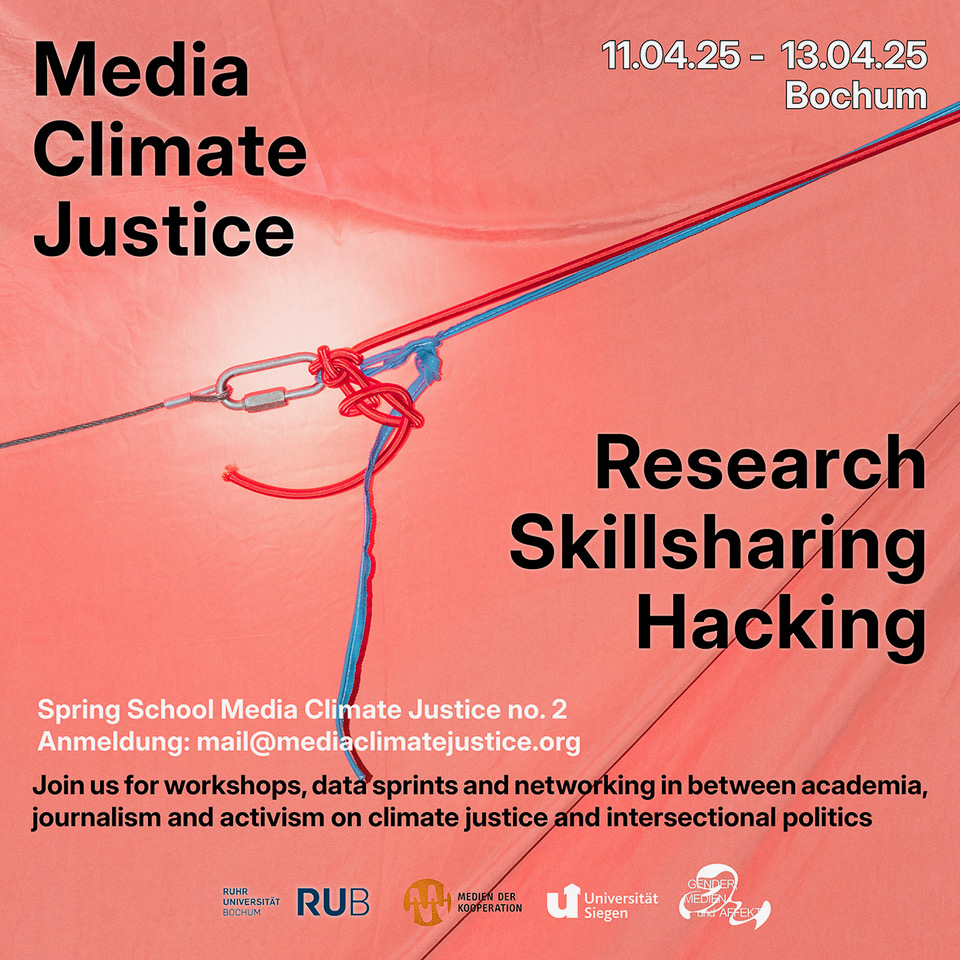
How we perceive the climate catastrophe and the associated ecological crises depends largely on how they are negotiated in the media. It is therefore also a question of the media whether and how people can be politicised or mobilised for climate justice. We highlighted this at our first Spring School in spring 2024 on climate, media and anti-fascism.
Now we want to continue our efforts to connect activism, journalism, art and science – and go beyond analyses: This time, the focus is particularly on digital research practices, climate journalism and climate activism on Tiktok: we’re learning some skills for sharing! For our programme, we have invited Correctiv’s climate editorial team and the research collective Tactical Tech, among others. We will be looking at climate narratives, migration and the far-right appropriation of the climate discourse. There will also be a workshop on climate justice issues in teaching at the university. In addition to inputs and workshops, there will be a performance on Saturday evening. Afterwards, we hope to raise a glass with you.
All interested parties from university, activism, journalism, art and civil society are cordially invited! Journalists, people interested in research, committed people – spread the word & come along.
About Research at Risk
Research at Risk is a working group in media and performance studies that understands research as a practice of knowledge production, exchange and criticism, which is not only facilitated by academics, but also by activists, journalists, artists and others. We work in the field between climate justice and antifascist coalition building with a strong emphasis on intersectional approaches. In 2022 and 2023 Research at Risk invited a variety of speakers to present and discuss different ways in which individual researchers as well as critical research as such are put at risk. For this purpose, we organized two lecture series on flight and scholarship as well as petro fascism. Departing from these conversations we are continuing our work in this practice-oriented spring school to tackle the above-mentioned interceptions between right wing politics and anti-climate sentiment.
SFB dissertations honoured with the Dirlmeier Foundation Prize
Christoph Borbach (University Siegen) And Sarah Rüller (University Siegen)
We congratulate our members on being awarded the Dirlmeier Foundation Prize for their outstanding research work.
→ to the complete press release of the University of Siegen (only in German)
About the award ceremony
Recognising the achievements of young researchers is an essential concern for the University of Siegen. Several university prizes were awarded in a festive setting in November and February. In addition to the Dirlmeier Foundation’s sponsorship award to SFB members Christoph Borbach and Sarah Rüller, other graduates were honoured by the University of Siegen, the Olpe district, the Chamber of Industry and Commerce and the DAAD for their outstanding work and extraordinary commitment. The award winners came together with their families and friends, the award-giving institutions and the laudatory speakers at the new Student Service Centre in Siegen city centre.
‘Promoting young academics is a central component of the University of Siegen. I am delighted that we are able to honour outstanding work and young people for their commitment, interest and professional achievements,’ said University Rector Prof. Dr Stefanie Reese.
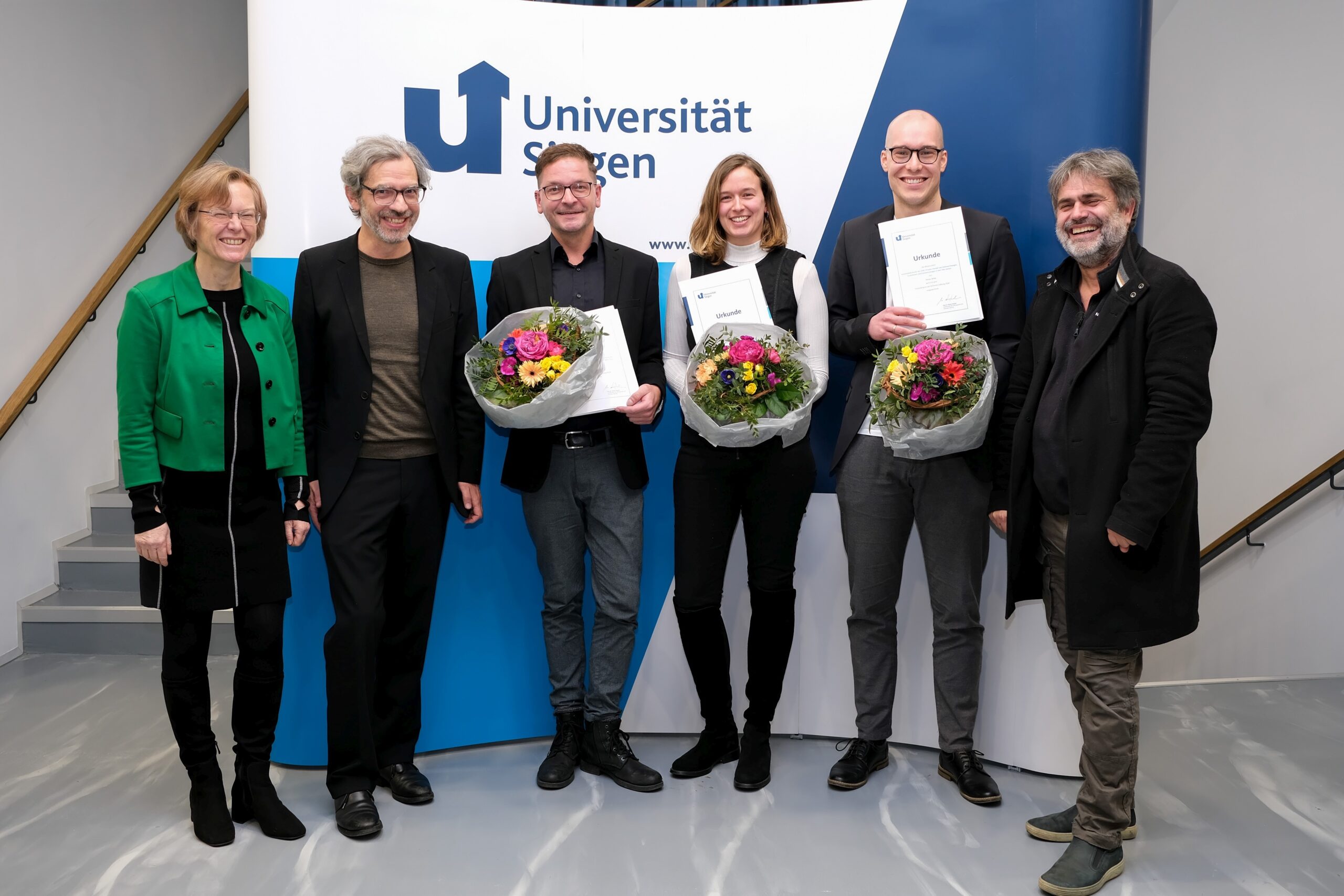
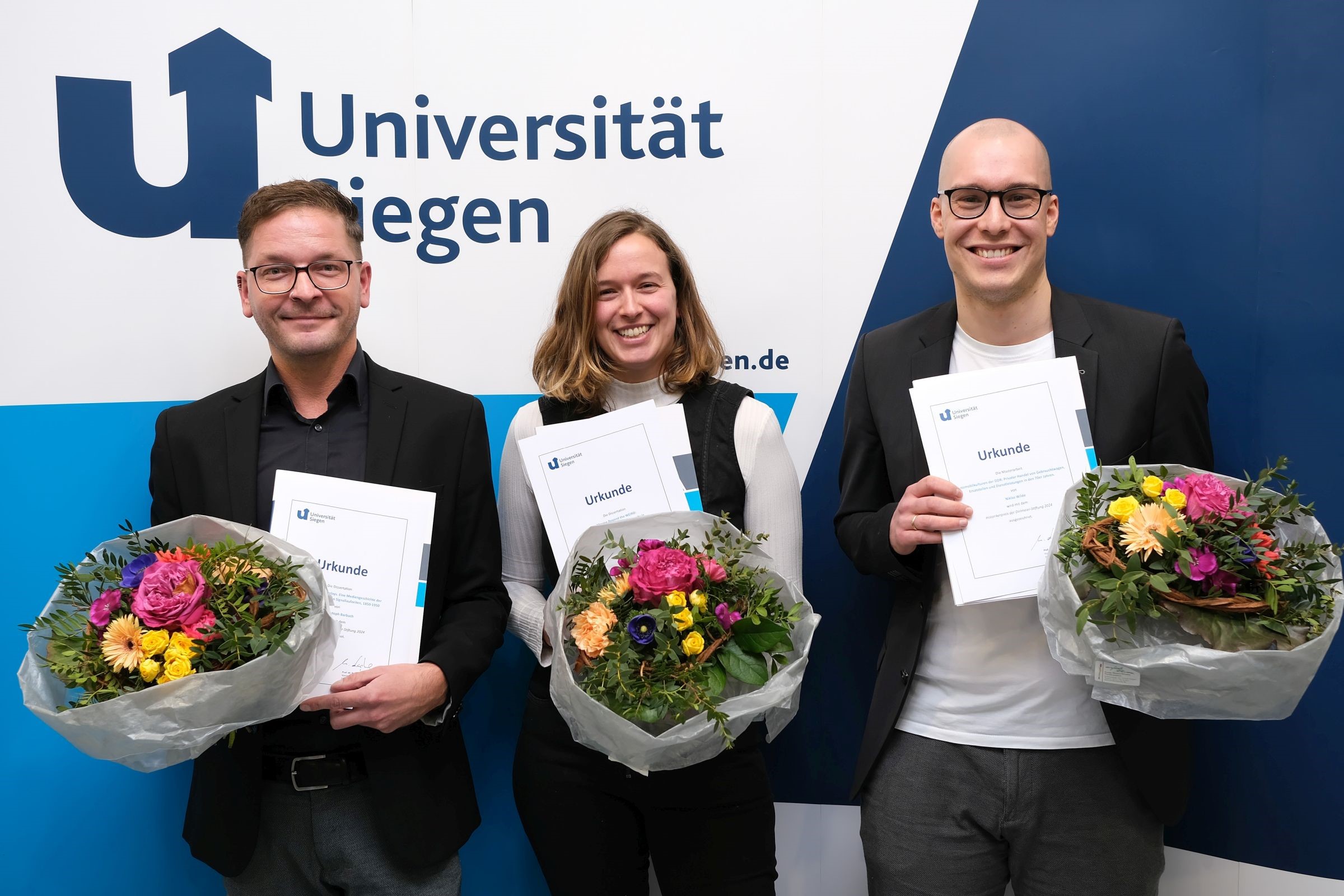
About the dissertations
Christoph Borbach: Delay – Media Histories, 1850-1950
→ available here (only in German)
In his dissertation Christoph Borbach examines delay, the propagation time of signals. Delay can be understood as a volatile actor with its own media history. Delay-based media such as sonography, sonar or radar have far-reaching implications for current media cultures. Historically, however, the datafication of environments and bodies as a function of transmission times first had to prove itself in practice. Christoph Borbach presents nine case studies of the early temporalization of spaces and bodies in contexts such as medicine, the postal service, the military, and computer technology. In doing so, he innovatively sheds light on the history of media, culture, knowledge, and practice of the actor delay—from the first media of remote sensing in the 19th century to infrastructures of processing big data in real time.
Sarah Rüller: Moving Beyond the WEIRD: Lessons from an Amazigh Community in Shaping Pluralistic Digital Futures
In her dissertation Sarah Rüller critically examines the complexities of conducting Western digital research in non-Western contexts through an ethnographic case study in the High Atlas Mountains of Morocco. The study highlights challenges related to postcolonial power structures, extractivism, and the impact of technocapitalism, challenging dominant frameworks of development and sustainability. By exploring the intersection of digital technologies, literacy, and community participation, the research argues for a shift from ICT4D (Information and Communication Technologies for Development) to ICT4R (Information and Communication Technologies for Recovery).
Through a participatory approach that integrates co-design, speculative design, and storytelling, the dissertation examines how local communities engage with digital infrastructures and navigate the tensions between digital inclusion, authenticity, and external exploitation. The study critically reflects on the role of human computer interaction (HCI) and design research in promoting ethically grounded, situated, and plural knowledge production. It also calls for a re-evaluation of academic research practices and urges a move towards more sustainable and community-driven methodologies. By advocating for multiliteracies and alternative epistemologies, the thesis contributes to shaping inclusive digital futures that respect local knowledge, agency, and cultural diversity.
About the researchers
Christoph Borbach is a researcher in the project P04 “Precision Farming: Co-operative Practices of Virtual Fencing” at the Collaborative Research Center 1187 »Media of Cooperation« His research interests include Media Theory & History, Media Praxeology & Epistemology, and Digital Media Cultures.
Sarah Rüller is a researcher in the project B04 “Digital Publics and Social Transformation in the Maghreb” at the Collaborative Research Center 1187 »Media of Cooperation«. Her research interests include Ethnography in Human Computer Interaction, Intercultural Learning Settings and Community Cooperation and Innovation.

Round table “TikTok hacken? Protest und Bildung auf Videoplattformen”
hosted by Julia Bee (Ruhr-Universität Bochum) and Jasmin Degeling (Bauhaus-Universität Weimar)
How can TikTok be a platform for political education and queer-feminist activism? In the round table “Hacking TikTok? Protest and Education on Video Platforms” media scholars and content creators take a critical look at TikTok’s potential as a space for democratic discourse.
Event info
February 21, 7 pm
Quartiershalle in der KoFrabrik
Stühmeyerstraße 33
44787 Bochum
About the panel discussion
In this panel discussion with Ole Liebl, Caspar Weimann, Judith Ackermann, Jennifer Eickelmann, and Philipp Hohmann, the hosts Julia Bee and Jasmin Degeling discuss the protest and education on TikTok.
Against the backdrop of digital platforms contributing to societal fascization and the particular advantage digital media provide to right-wing political strategies, the participants will discuss which formats and artistic practices on TikTok and similar platforms can promote democracy through political education and queer-feminist activism.
TikTok creators critically address antifeminist and right-wing (online) radicalization, masculinity critique, queer joy, sexuality, and gender on their channels. They position themselves as queer-feminist and antifascist voices and advocate for the queer community.
In this discussion, content creators and media scholars will examine the possibilities of political education and a democratic media culture on TikTok. Join us and be part of the conversation on TikTok as a tool for political education and the role we can play in it.
About the participants Guests: Ole Liebl (Content Creator, @oleliebl) Hosts: Julia Bee (Professor for Gender Media Studies with a special focus on diversity, Ruhr University Bochum; CRC 1187 “Media of Cooperation”, Project B09 – „Bicycle Media. Cooperative Media of Mobility”)
Caspar Weimann (Honorary Professor and Mentor for Acting at the ADK Baden-Württemberg; @onlinetheater.live)
Philipp Hohmann, (KosmoPolis – registered Association for Queer Nightlife Culture; @ovalofficebar)
Jennifer Eickelmann (Junior Professorin for Digital Transformation in Culture and Society, FernUniversität in Hagen)
Judith Ackermann (Research Professor for Digital Media and Performance in Social Work, Potsdam University of Applied Sciences; @dieprofessorin)
Jasmin Deneling (Junior Professor for Media Anthropology, Bauhaus-Universität Weimar)
The panel discussion is organized by the Chair of Gender Media Studies with a special focus on diversity at Ruhr University Bochum, the Chair of Media Anthropology at Bauhaus University Weimar, the DFG research network Gender, Media, and Affect, and KosmoPolis e.V.
RESAW 2025 – The datafied Web
More than 40 presentations by over 70 researchers from 11 countries shape the program of the RESAW 2025 conference, which will take place on June 5 & 6 at the Collaborative Research Center 1187 “Media of Cooperation” in Siegen. Registration will be possible from March 2025.
→ See the conference programme
About the RESAW conference and community
RESAW is the acronym for A Research Infrastructure for the Study of Archived Web Materials. The RESAW community is dedicated to working with digital cultural heritage and gathers every two years at the eponymous RESAW conference.
RESAW was founded in 2012 with the goal of building a collaborative European research infrastructure for studying and working with web materials while fostering knowledge exchange across Europe. This presents significant challenges for both research and the archiving of web-based information and objects.
RESAW 2025 – The datafied Web at the University of Siegen
Over the last two decades the Web has become an integral part of European society, culture, business, and politics. However, web content disappears rapidly—the average lifetime of a web page is two months. To provide future access to this increasingly important digital cultural heritage, key research infrastructures in the form of national Web archives have been established in several European countries.
A web archive is a collection of web material that was born online. However, for the researcher who wants to study values and lifestyles, views and beliefs, identities and cultures across European borders, these national Web archives become an obstacle since they delimit the borderless flow of information on the internet with national barriers. High-quality research across borders requires free and efficient cross-border researcher access to national Web archives. To meet this need, RESAW will establish and operate a collaborative world-class trans- national European research infrastructure that enables cross-border studies of the archived Web by integrating and opening up existing Web archives.
RESAW mobilises a comprehensive consortium of partners, including the national Web archives of Denmark, France, the Netherlands, Portugal and the UK, and the US-based Internet Archive, as well as six research institutions and one specialist consultancy company from six different Member States.
RESAW is in line with the EU’s ambitions expressed in The Digital Agenda for Europe, and it will provide services that do not exist today, putting Europe at the forefront in this field. By facilitating easy access to large amounts of cultural heritage, Big Data, and searching, selecting, and analysing the material, RESAW will make the research process more efficient and enhance the European Research Area. It is thus expected to have a transformative impact on a wide range of researchers who want to use material from national Web archives other than their own.
The sixth RESAW conference is dedicated to tracing the historical roots of the data-driven paradigm in web development. It closely examines trends, trajectories, and genealogies of a datafied and metric-driven web, as well as the rise of platform-based ecosystems. Investigating the historical context, aesthetics, and role of web counters, analytics tools, mobile sensors, and other metrics can contribute to a deeper understanding of online interactions, past publics and audiences, and their (at times problematic) developments.
The theme “The Datafied Web” also raises questions about methods and (web) archives that enable the study of this transformation: What challenges and methodologies arise in archiving a metrified and increasingly mobile web, including its back-end infrastructure? Additionally, the theme invites an exploration of the historical development of data collection and the evolution of web-based data monitoring practices. Related topics include the historical trajectories of tracking mechanisms, cookies, and the emergence of digital footprints, as well as the evolution of metric-dependent businesses and the financialisation of web spaces and their implications.
Taking a historical web analysis perspective, the conference examines mediated environments and asks: How has the datafied web shaped the sensory media environments in which we live today?
Highlights of RESAW 2025
To mark the 10th anniversary of the RESAW conference, a panel discussion organized by Niels Brügger will take place. Be sure to save the date: Friday afternoon, June 6.
A special highlight of this year’s conference are the keynote lectures on Thursday evening and Friday morning, delivered by Nanna Bonde Thylstrup, Associate Professor in Modern and Digital Culture at the University of Copenhagen, and Jonathan Gray, Reader in Critical Infrastructure Studies at the Department of Digital Humanities, King’s College London. Nanna Bonde Thylstrup will speak on “Vanishing Points: Technographies of Data Loss”, approaching the critical study of disappearance through the development of a technographic approach. Jonathan Gray will deliver a keynote on “Public Data Cultures”, historicizing the legal and technical conventions of open data. Drawing on a series of empirical vignettes, he will reconsider data as cultural material, a medium of participation, and a site of transnational coordination.
A total of 22 panels at RESAW 2025 will feature over 70 presentations from researchers based in Siegen and across the international RESAW network—including participants from Luxembourg, the Netherlands, France, the United Kingdom, Sweden, Denmark, Belgium, the United States, Portugal, and Israel. On Thursday, panels will shed light on platforms and social media, monetization and web archiving practices, and dealing with data loss, among other topics. On the second day, the focus will be on the Skybox research programme, the history of platforms and research methods.
The conference promises insightful discussions on current research questions related to the trends, trajectories, and genealogies of a datafied and metric-driven web. It will also foster critical dialogue on the challenges and opportunities posed by the rise of platform-driven ecosystems.
The 2025 RESAW conference is organized by the Collaborative Research Centre 1187 “Media of Cooperation” at the University of Siegen in cooperation with the Centre for Contemporary and Digital History (C²DH) at the University of Luxembourg. The conference is funded by the Deutsche Forschungsgemeinschaft (DFG, German Research Foundation) and the Luxembourg National Research Fund (FNR).
3 / 16
